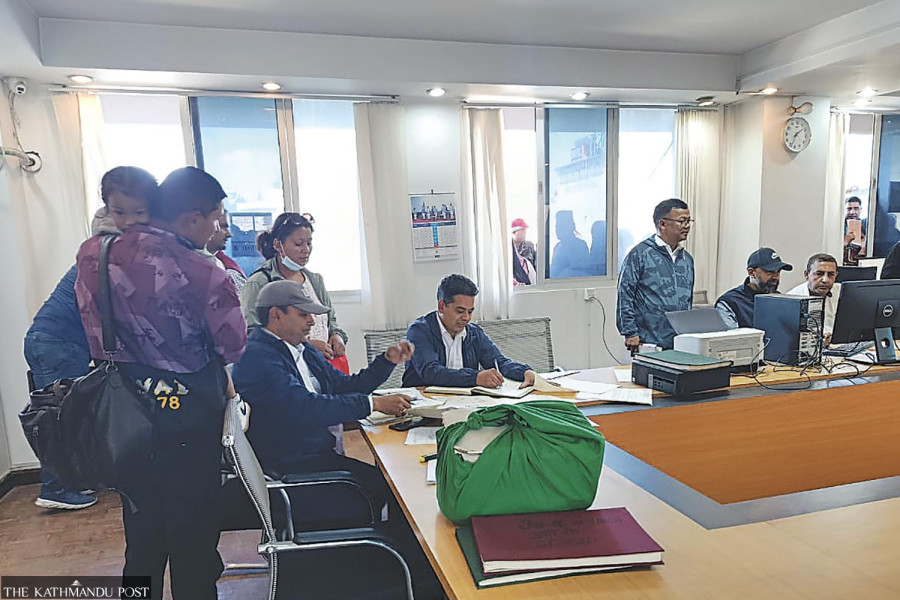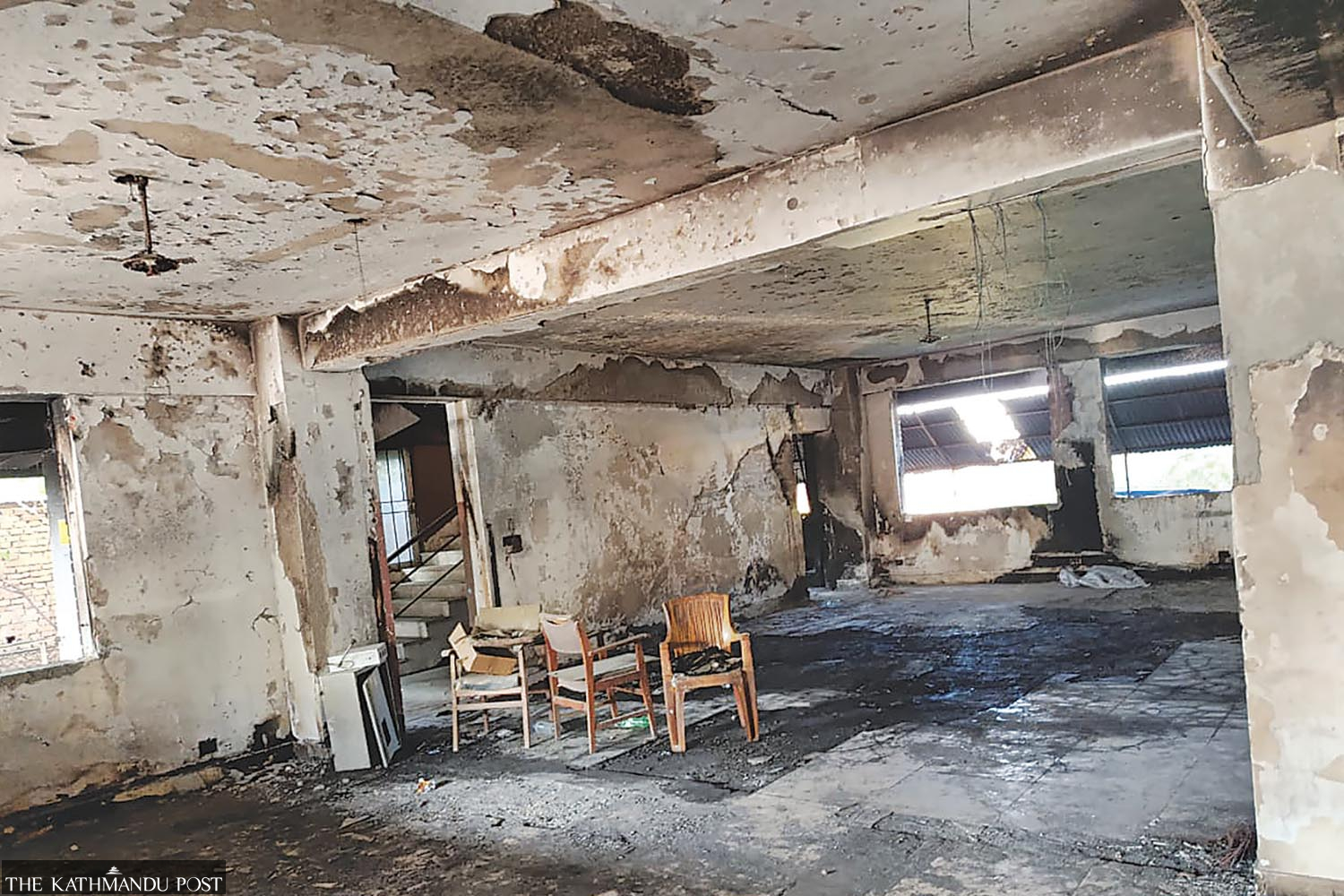National
Fire-ravaged Kalanki Land Revenue Office reopens, services hit by crowds and limited resources
Service seekers frustrated as long queues, record confusion, and strained office resources slow services.
Purushottam Poudel
During the nationwide anti-corruption protests on September 8 and 9, arson attacks destroyed records in several Land Revenue Offices, forcing landowners to go through lengthy processes to verify and restore their land ownership documents. For this, landowners are required to be physically present and submit various documents.
Land Revenue Offices in Kalanki, Bharatpur, Kaski and several other districts have issued notices instructing landowners to apply for record verification with the required documents.
According to the Department of Land Management and Archive, 21 Land Revenue Offices, including those in Kalanki, Kaski, Bharatpur, Banke, Morang, Butwal, Dhangadhi, Khairahani, among others, were affected by arson during the protests launched by Gen Z youths.
Officials at the department said some of these offices do not have complete digital records. In cases where digital archives are unavailable, the process of verifying and restoring ownership records becomes complicated and lengthy, as outlined in the Land Administration Directive 2025.
“All the Land Revenue Offices that were burnt and destroyed during the protests are digitalised,” said Khimananda Acharya, spokesperson for the Department of Land Management and Archive. “However, records of service seekers who had not accessed any services after the offices became digital may not have been digitised. In such cases, collecting the necessary evidence could be somewhat complicated, according to our assessment.”
The digitisation of land revenue offices started in 2018.
After the government issued a notice urging landowners to verify their land ownership records, the Kalanki Land Revenue Office began the process on Sunday. When visited on Sunday afternoon, the office was crowded with people.
The smell of smoke still lingered in the building, which had been set on fire by protesters on September 9. Repair work has just begun. The ground and the first floor, once bustling with people, have been reduced to ruins. At present, work is being carried out only on the third and fourth floors, and even there, with limited resources.
“We operated the office only for essential services on Sunday,” said the chief of the office, Rabin Dhakal.

However, due to a server problem, the notice regarding service resumption was published only on Sunday morning. As a result, a large number of service seekers arrived on the very first day.
“We had opened the office on Sunday only to process new land mortgage registrations and the release of properties under existing mortgages,” Dhakal said. “However, other service seekers also showed up.”
The crowd in the Kalanki Land Revenue Office doubled when the office was unable to operate for nearly two hours in the afternoon due to a power cut, which further increased the pressure on those waiting for services.
“We have resumed work from only two floors, as three floors were damaged during the protests,” Dhakal told the Post. When the office operated at full capacity, it provided services through around 30 computers. Currently, there are about 15 computers, and only five of them were functional on Sunday.
Many service seekers are visiting the office to have their land records verified, as the office’s records were destroyed in the arson attack. However, verification of records and new registrations can only begin after the Tihar festival, which is around two weeks away. The office has requested the public not to rush just for record verification.
Although Dhakal said there was no need to hurry, Kirtipur resident Kuntala Devi Rai faced difficulties on the very first day. She had come to the office to register a land mortgage, but the record on her ownership document did not match the data in the office’s server, forcing her to run between various sections in the office.
Similarly, Santosh Neupane, who is set to return abroad after Tihar, also faced complications. He had purchased a plot of land in Kirtipur and had already paid the full amount. However, due to the protests, he was unable to complete the registration process and obtain the ownership certificate in his name.
“I have already extended my leave and will have to return immediately after Tihar,” Neupane told the Post. “There is no certainty that the land transfer will be completed before Tihar.”
Neupane questions the impact of the Gen Z movement, saying that instead of bringing stability to the country, it caused destruction. He wondered whether the new generation had actually managed to pave a better path.
In the notice issued by the Ministry of Land Management, Cooperatives and Poverty Alleviation, the ministry directed that if a land record is verified in the office’s computer system, it should be authenticated by matching it with the service seeker’s documents. However, service seekers complain that the Land Revenue Office has been giving them unnecessary trouble by demanding irrelevant documents.
Seventy-one-year-old Ranganath Khanal, who helps service seekers with paperwork, said that the office was unnecessarily creating hassles.
“While the ministry’s instructions are clear, the Land Revenue Office has been demanding documents not mentioned in the directive, causing inconvenience to the public,” Khanal complained.
However, the office chief Dhakal, denies the allegations, claiming that the office has not been demanding excessive documents. “When the evidence provided by the service seeker matches the records in our system, we carry out tasks ranging from verifying land ownership to placing and releasing land mortgages,” he said.
Dhakal further said that the Land Revenue Office is a highly sensitive institution, as even a minor error could result in the transfer of one person’s land to the wrong person. Therefore, he argued, the office must exercise extreme caution.
Dhakal further mentioned that the government had earlier required service seekers to submit 11 different documents to verify records or access services at the Land Revenue Office. However, following public complaints, the number of required documents has been reduced.
Now, service seekers are only required to submit the original land ownership document, citizenship certificate, verification letter issued by the office, and proof of land tax payment.
Officials at the Kalanki Land Revenue Office said their work has also been hampered due to budget constraints. They explained that the office’s allocated budget has already been spent on repairs and maintenance, and they are now waiting for additional funds to be released. Although a few municipalities have provided computers and other equipment needed for operation, further support from the government is still awaited.




 20.12°C Kathmandu
20.12°C Kathmandu














